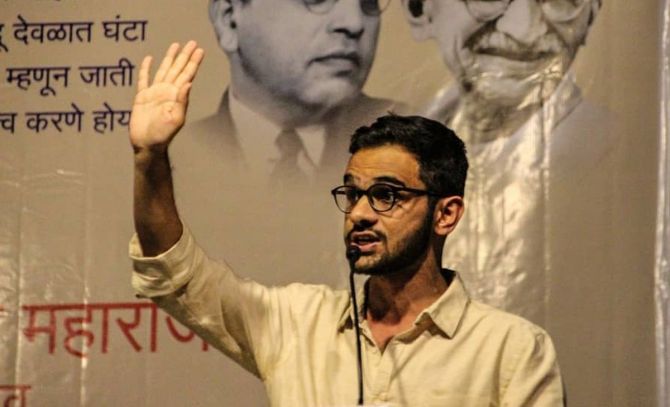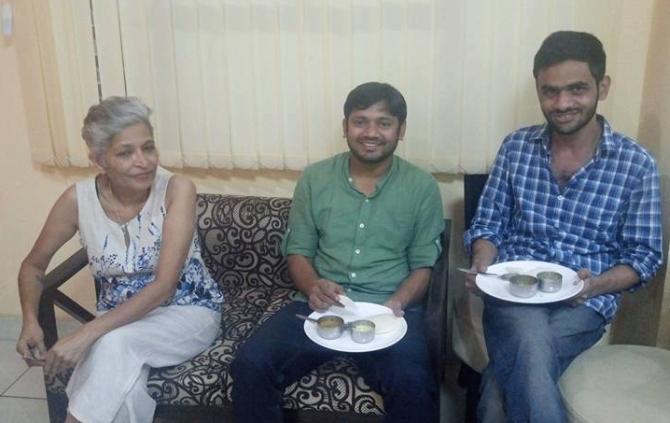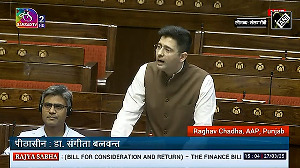'We were activists when we were students. It was as students that we were propelled to fight for justice. Neither of us regret that.'
'Where the country is now, more and more people should become vocal.'

On Tuesday, May 28, 2024, a trial court in Delhi rejected Dr Umar Khalid's bail. This is the third rejection since the fiery student leader was put behind bars on charges of having conspired to plan the February 2020 Delhi riots.
In September, Umar will complete four years in jail. Banojyotsna Lahiri, a researcher in Delhi and his partner since 2013, tells Jyoti Punwani what these years have been like for her, and why, despite the latest disappointment, she doesn't lose hope.
You must be disappointed by Tuesday's bail rejection. Or, were you expecting it, considering this was the trial court?
Well, yes, it is the lower court. The Chief Justice himself recently observed that trial courts are 'increasingly reluctant to entertain matters concerning personal liberty.' Specially when the charge is UAPA, lower courts have not taken strong decisions.
But nonetheless, today's rejection was disappointing. Because we expect that some court will see through this false case.
Also, we must remember that Umar was slapped with two cases, and it was the lower court that discharged him from one of them. So we did get half-way justice earlier from the trial court.
When Umar's lawyers withdrew his bail application from the Supreme Court in February, it meant going back and starting from scratch. So you must have been prepared for the long haul.
We can't afford not be prepared. We have to accept that we're in it for the long haul.
When Umar was arrested in September 2020, did you think he would be behind bars for so long?
No, of course not. I knew that a UAPA case usually stretched out for a long time with no trial, and that bail is usually denied. But I had thought he'll be out in a couple of years; the courts would see through the absurd charges.
But it's been four years and the trial has not even begun, this is too much.
Did there ever come a point when you told yourself: 'Ok, now he's not coming out for a long time.'
When the (Delhi) high court denied him bail in October 2022. That was really a big disappointment. Specially because the same high court had given a different verdict just a year ago in the very same case. That order had granted bail to Umar's co-accused.
That judgment had come from a bench which had one of the two judges hearing Umar's bail petition. There, the judges had pointed out the difference between the right to protest and terrorist activity. But in Umar's bail order, the same judge was signing on something that defeated his own reasoning!
It was difficult to understand and I was very very disappointed.
(Delhi high court judges Justice Siddharth Mridul and Justice Rajnish Bhatnagar dismissed Umar Khalid's bail petition in October 2022. In June 2021, Justice Mridul and Justice Anup Jairam Bhambani had granted bail to Umar's co-accused Natasha Narwal, Devangana Kalita and Asif Tanha.)
Which was the worst period for you?
Last year, May 2023 onwards in the Supreme Court.
In the lower court, things were happening. First the Covid lockdown was there, courts were not functioning. Even the judge got hospitalised. After that hearings started, we were arguing.
In the high court too, we were arguing. The high court didn't take extraordinarily long to hear Umar's bail petition.
It was in the Supreme Court, after we applied for bail in May 2023, till we gave up and withdrew our petition in February 2024 -- that entire time was the worst. The judges would come and just give another date. We were hopping from one Bench to another. Nothing was coming out of it, it was torturous.

At times like that, or today, when his bail has once again been rejected, do you cheer him up or does he cheer you up?
He cheers me up more than I cheer him.
Is that because he is more resilient or does he put on a mask for your sake?
I believe it is a little bit of both.
I can understand why he does so. They want us to give up and become hopeless. If we do that, what was the point of our struggle? They want to crush our spirit and silence us, and through us, silence others. But by losing hope, we will be doing exactly what they want.
Yet, you do get depressed.
Yes, I tend to feel very low. That's because we are free, we've got all the freedom we want. I want him to be part of that life. I don't want him to be incarcerated.
Do you also cheer up his family?
His family takes good care of me. Actually we keep checking on each other. They are very strong, both his parents.
How often do you get to meet Umar? Can you talk to him freely in jail, in court?
We meet in Tihar jail once a week. There is no interference, we can talk freely, separated, of course, by a glass partition.
In court, we are allowed to meet, but not for very long. Sometimes the court grants us permission to meet in the court lock up. They do allow us to meet in the court room too, but it's for not more than 2 to 5 minutes.
When he was first arrested in 2016, right until now, you've been in and out of courts. Did you know the functioning of the law, the justice system then?
No, I didn't. When he was charged with sedition in 2016, I didn't know what was Section 124 A. Why would a common person know these sections?
Now I know Section 43B of the UAPA and all the relevant provisions of the Act. I've become a lawyer myself!
What of the police? What have you learnt about them?
With the police, it's been a mixed experience.
The Delhi police is the reason we've had to suffer. It is the Delhi police special cell that filed this fictitious chargesheet against Umar and the others, charging them with planning the Delhi riots, when it was actually the Delhi police who played an active role in the riots. They were caught on camera stamping on dying people.
Yet, at the same time, I've seen another side of the same police. There was an assassination attempt on Umar in 2018, after which he was given security by the government. Those were Delhi police constables.
They took care of him, they really defended him, they would fight with others for him. They were really nice.
So I have to admit that I can't condemn the entire Delhi police. There are very good human beings in the same force.
Are they kind to you in court?
In the beginning, hundreds of policemen would escort Umar and his co-accused. The entire area would be cordoned off by gun-toting policemen, Everyone would be kept away, no one was allowed inside the court.
But gradually, even they got tired of this drama. Now, it's like a normal courtroom, we can all enter it. Sometimes they are friendly with us, sometimes very khadoos/
You've seen the working of the court now from close quarters. What do you think about them?
I cannot give up hope in the judiciary. They have passed some very good orders in these four years -- for example, the orders granting bail to Vernon Gonsalves, Shoma Sen (in the Bhima Koregaon case). Those orders have also come from the same judiciary. Maybe they've come after a delay of 5 years, but we know that things work slowly in court.
Then there were the lower court orders granting Umar bail and finally a discharge in December 2022 in the other riots case, where he was accused of stone-pelting. The discharge order was so well-articulated.
So I can never give up on hope in the judiciary.

'Her fearlessness was inspirational,' Umar told Rediff.com after Gauri's murder. Photograph: Rediff.com Archives
Have you suffered because of your association with Umar Khalid at your workplace, your neighbourhood, your acquaintances and family?
My colleagues at my workplace are very cooperative. I've worked in three places over these years, and everywhere, they've been very sympathetic.
My family is from Bengal so they are progressive.
As for my neighbours -- I stay in a Muslim area. While I don't go around advertising my relationship with Umar, there are a few who know about it and they show their solidarity.
Do you think Umar has been targeted because he is Muslim?
Yes. In 2016 when he was arrested (along with JNU students Kanhaiya Kumar and Anirban Bhattacharya for allegedly organising an event in memory of Afzal Guru and shouting 'anti-national' slogans), the media stereotyped him because of his Muslim identity.
While all communities protested against the CAA, the law itself was targeted against Muslims; the ruling class made no bones about that. Then the narrative was spun that those behind the CAA protests also organised the riots. So yes, his Muslim identity has a lot to do with why he remains behind bars.
Do you sometimes feel that both of you should have remained students, instead of becoming activists, considering all that you have faced?
We were activists when we were students. It was as students that we were propelled to fight for justice. Neither of us regret that.
Where the country is now, more and more people should become vocal. In fact, a lot of people have become activists now, they are speaking out.
But you paid a heavy price for your activism.
Had the CAA been passed at that time, without any resistance, that would have been a heavier price to pay.











 © 2025
© 2025